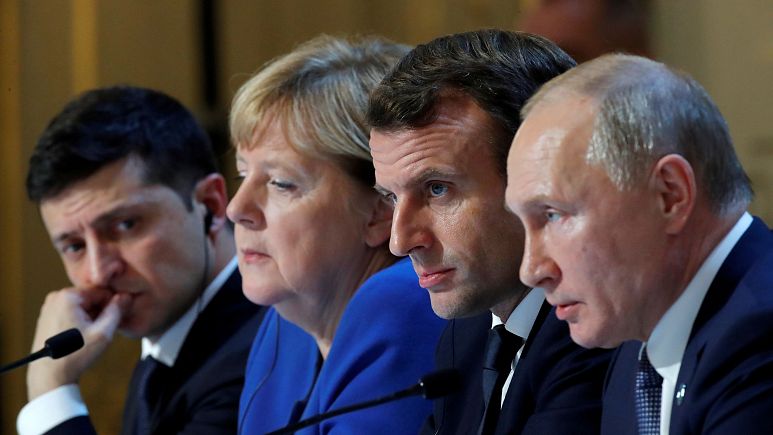
Macron positive after Zelenskiy's first face-to-face with Putin
by Alice TideyUkrainian President Volodymyr Zelenskiy met his Russian counterpart Vladimir Putin for the first time since taking office, at a summit in Paris on Monday to discuss the situation in eastern Ukraine.
Convened by French President Emmanuel Macron and also attended by German Chancellor Angela Merkel, the summit is the first real test for the Ukrainian leader who ran for office on a pledge to end the protracted conflict in his country.
Adding to the pressure for the comedian-turned-politician is the fact that thousands rallied on Sunday in Kyiv calling on him not to "capitulate" and grant Putin too many concessions.
More than 13,000 people have died in the five-year conflict opposing Ukrainian security forces and Russian-backed separatists, including some 3,300 civilians, according to the UN.
A ceasefire was agreed to in the Minsk Protocol signed in 2014 but has been violated with outbreaks of fighting regularly recorded near Donetsk and Luhansk.
Summit an achievement
Speaking at a joint press conference after the meeting, Macron hailed the very fact the summit was held as an achievement.
"The fact that we are side by side today in Paris is in itself an important outcome in many ways, a credible resuming that is in no way obtained in advance considering the absence of a concrete progress for several years," he said.
Angela Merkel meanwhile said while there is a lot of work to do, there is "goodwill to resolve difficult questions", adding she was very pleased with the meeting.
'Something tangible'
Zelenskiy argued in a Facebook video released last week that the meeting "is already a victory for Ukraine".
He then defended the decision to meet with Putin despite the Russian leader refusing to put the annexed peninsula of Crimea on the negotiating table by telling Ukrainian television that Russia's release of Ukrainian sailors and vessels is "a signal that Russia is ready to talk".
But expectations of a breakthrough are fairly low.
Analysts say that Zelenskiy in particular needs to return home with "something tangible."
"A cease-fire and a prisoner swap should be well within reach. No party will want to walk home empty-handed, and at least officially, both Ukraine and Russia are interested in a cessation of hostilities and the return of prisoners," Cyrus Newlin and Jeffrey Mankoff from the Center for Strategic & International Studies think tank, wrote in a note last week.
'Strategic dialogue'
Beyond Crimea, which Russia annexed in 2014, one of the main areas of contention is the province of Donbas — where Donetsk and Luhansk are located — and its status.
Zelenskiy has stressed that elections would only be held in the separatist-held province once Moscow had relinquished control of the border and withdrawn its troops.
But Russia is unlikely to do so, having advocated for the region to be granted a special status which would see it continue to exert influence in Ukrainian politics.
Zelenskiy has called on both Paris and Berlin to support his position on the different issues but the latest summit comes amidst a push by Macron to reopen "a strategic dialogue" with Russia.
"If we want to build peace in Europe, to rebuild European strategic autonomy, we need to reconsider our position with Russia," he told the Economist magazine last month.
Zelenskiy, who used to play the Ukrainian leader in a popular television show before his election, might find a more receptive audience in Merkel.
Germany expelled two Russian diplomats last week over Moscow's suspected involvement in the murder of a Georgian activist in Berlin.